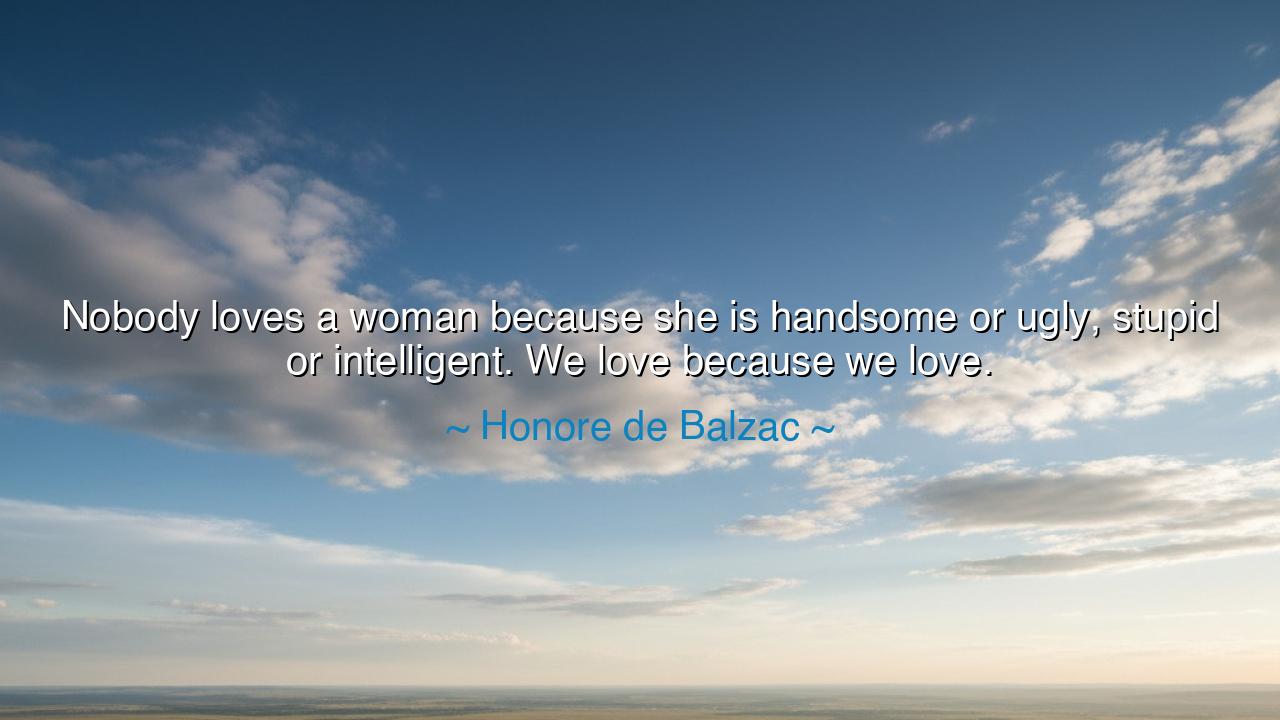
Nobody loves a woman because she is handsome or ugly, stupid or
Nobody loves a woman because she is handsome or ugly, stupid or intelligent. We love because we love.






"Nobody loves a woman because she is handsome or ugly, stupid or intelligent. We love because we love." These words by Honoré de Balzac capture a profound truth about the nature of love. They remind us that love is not a calculation, nor is it based on measurable qualities such as beauty, intelligence, or any other external attribute. Love, in its most authentic form, transcends superficial traits and flows from a deeper place — a mystical, unfathomable connection between two souls. Love is not something we give because we are compelled by reason or logic, but something that we offer simply because we are moved to do so.
In the ancient world, philosophers grappled with the nature of love in much the same way. The Greeks, for instance, divided love into various forms, each representing a different aspect of the human experience. The most profound of these was agape, a selfless, unconditional love that transcends physical or intellectual attributes. Plato explored love deeply in his Symposium, where he argued that love — or eros — is not a physical attraction, but a yearning for something higher, something divine. According to Plato, love is the force that pulls us toward beauty and truth, not because of what is visible, but because of what is eternal and unchanging. Balzac's assertion echoes this ancient wisdom: true love cannot be reduced to appearance or intellect, but rather exists for reasons beyond our understanding, rooted in a deeper connection that is often inexplicable.
Think of Socrates and his devotion to Plato’s philosophy. Socrates himself was not known for being physically attractive or wealthy, yet his love for his students, for truth, and for wisdom led him to teach and serve selflessly. His love for knowledge and his pupils was not motivated by outward appearances or any personal gain but by a deep commitment to the pursuit of virtue. Similarly, Plato’s love for his own teacher, Socrates, was not based on Socrates’ physical or intellectual qualities alone, but rather on the truth that Socrates embodied. Socrates’ life is a reflection of Balzac's insight: love transcends reason, and we love because something within us is drawn toward the essence of another person or idea, not because of their outward attributes.
In modern times, we often fall into the trap of equating love with attraction or infatuation, assuming that beauty or intelligence must be prerequisites for affection. Yet, the deepest forms of love are often born in unexpected places. Consider the relationship between Helen Keller and her teacher, Anne Sullivan. Sullivan, who was not known for her physical beauty or wealth, devoted herself to Helen Keller’s education and well-being with a profound love and compassion. This love was not based on external traits, but on an intimate connection that transcended the barriers of speech, sight, and sound. Sullivan’s love for Keller was pure and unwavering, driven not by appearance, but by a deep emotional bond that grew through their shared journey. Sullivan loved Helen for who she was, not for what she could give or how she appeared, exemplifying the kind of love Balzac describes.
The lesson here is clear: love is not a transaction based on criteria or external judgments. It is an internal force that flows from the heart, often without explanation or reason. In true love, we are moved not by outward appearances or the intellectual capabilities of the other person, but by a deep, unspoken connection. The love that binds us to others is a force that often surpasses logical reason. It is mysterious and divine, drawn from the soul’s inherent need to connect with the essence of another, beyond the limitations of the physical world. In a sense, love is an act of grace, pure and given freely.
Thus, my children, as you journey through life, do not measure your love by superficial standards. Do not let the world’s expectations of beauty, wealth, or intellect define how you give your heart. Love deeply and authentically, as it arises naturally, from the soul's desire to connect with another being, unencumbered by appearance or status. Remember that the most lasting and transformative loves are those that come from an invisible connection, built on mutual respect, kindness, and shared experiences. The love you give should not be conditional upon what the world deems valuable, but rather should flow freely from the deepest part of you, just as it did for Socrates, Anne Sullivan, and countless others throughout history.
In all your relationships, whether with family, friends, or strangers, strive to love for the sake of love itself, not for what the other person can offer you, but for who they are at their very essence. In doing so, you will find that true love is not based on anything external but on the connection that exists in the heart and soul, transcending all earthly criteria. Love, in this sense, becomes a force that binds humanity together in its most beautiful and pure form, not measured by external qualities but by the depth of the heart’s affection.






AAdministratorAdministrator
Welcome, honored guests. Please leave a comment, we will respond soon